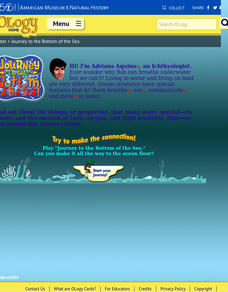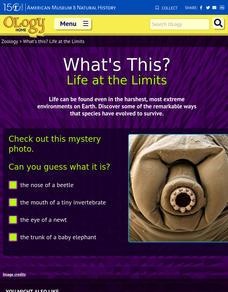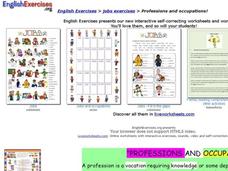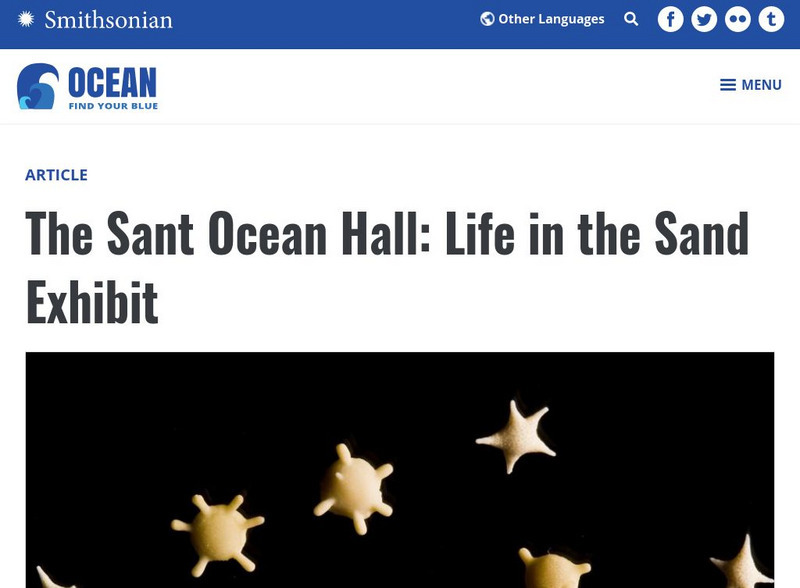American Museum of Natural History
What do You Know About Marine Biology
Show me what you know about the sea. Learners answer 10 questions about marine biology. The questions range from what evidence points to the origin of life to the biggest threat to oceans.
American Museum of Natural History
Ocean Creature Feature
From coloring to hard protective shells, ocean creatures have adaptation features that help them survive. An eight-question online quiz highlights different ocean animals and their unique characteristics. The resource then offers pop-up...
Project WET Foundation
Discover Our Ocean
A very informative interactive presents ocean zones, estuaries, hot water vents, phytoplankton, coral reefs, sea turtles, kelp forests, and all things that thrive in the ocean.
NOAA
Chemosynthesis and Hydrothermal Vent Life
What's life like in a hydrothermal vent? Find out in part five of a 13-part series. Learners journey to one of the harshest environments on the planet, the hydrothermal vent, to learn about the creatures that survive the extreme...
American Museum of Natural History
Dive Into Worlds Within the Sea
Make connections between ocean organisms. Individuals explore three different ecosystems in the ocean. With an online interactive, they learn how different organisms depend upon each other. Learners first answer questions to connect...
American Museum of Natural History
Journey to the Bottom of the Sea
Follow the path to the sea floor. Pupils play an online interactive board game to reach the bottom of the sea. Participants must match descriptions of creatures to a property of water dealing with oxygen, food, light, or density to move...
American Museum of Natural History
Journey to Deep Sea Vents
Take a deep dive into oceanography. The online interactive allows for learners to board a submersible to dive to the bottom of the ocean to investigate sea vents. On the way down, individuals see different marine life at different...
Scholastic
Study Jams! Aquatic Ecosystems
Mia's friends are fish-sitting while she is away on vacation. Zoe divulges to Sam that different animals need different habitats, and that there are both freshwater and saltwater ecosystems. Examples of the kinds of organisms found in...
Curated OER
ESL: Sea Animals Activity
In this ESL sea animals worksheet, students watch a video about sea animals, then identify names of animals shown in pictures.
Curated OER
Ocean World
In this online interactive science worksheet, students respond to 7 multiple choice questions regarding icebergs. Students may submit their answers to evaluated.
American Museum of Natural History
Journey to the Bottom of the Sea
Properties of water make it essential for the life of marine species. Learners complete an online game to answer questions about the role water fulfills for organisms in ocean habitats. The game emphasizes the properties of water and how...
American Museum of Natural History
What's This? Life at the Limits
There are some amazing ways species evolve to survive. From large ears to sneezing salt, learners read about these interesting adaptations in an interactive lesson. Great to supplement an in-class lesson, it also works well as a remote...
NOAA
Seamounts
How do chains of islands form? Young oceanographers explore the mountains of the deep in the final installment in a 13-part series. The interactive compares types of seamounts based on their overall height and height under the water, as...
American Museum of Natural History
Find My Plankton Baby Picture
Get a better understanding of babies in the sea. The class learns about the two kinds of plankton. They then determine the baby pictures of eight marine animals given a picture of the adult and some hints about the larvae. When scholars...
Curated OER
Phytoplankton
In this phytoplankton worksheet, learners read and study online information on plankton blooms to answer 8 short answer questions about the topic.
American Museum of Natural History
Moving Mammals
How many different ways do mammals move from place to place? An online resource uses animation to show how different mammals move. Learners use a slider to speed up or slow down a variety of mammals. The versatile lesson works as a...
Curated OER
Explorit's SEASHORE Quiz
In this online interactive seashore quiz instructional activity, students respond to 5 multiple choice questions. Students may check their answers for accuracy.
Curated OER
General Knowledge Questions- All School Subjects Lower Intermediate
For this interactive general knowledge worksheet, students complete 24 multiple choice questions based on their knowledge in several subject areas. These subjects include science, geography, sports and music.
Curated OER
ESL: Dolphins Activity
In this ESL dolphins worksheet, students read an article about dolphins, then complete a set of 10 multiple choice questions; answer may be checked on-line.
Curated OER
Location Prepositions 2
In this online interactive grammar skills worksheet, students respond to 10 fill in the blank questions regarding the use of prepositions.
Curated OER
Breaking News English: Noise Pollution in the Oceans
In this noise pollution in the oceans worksheet, students read the article, answer true and false questions, complete synonym matching, complete phrase matching, complete a gap fill, answer short answer questions, answer discussion...
Curated OER
English Exercises: Jobs and Professions
In this ESL worksheet, students listen and watch a YouTube clip of an animated song about jobs. Students complete 100 exercises in an online quiz. Included are: matching jobs with pictures, a word search, and fill in the blank.
Curated OER
Paragraph Editing: Using agreement with an essay
In this editing activity, students read 4 paragraphs and edit the sentences in them. Students edit 28 sentences total and can check their answers.
Smithsonian Institution
National Museum of Natural History: Ocean Portal: Life in the Sand
This article is the companion to the exhibit on Oceans at the Smithsonian. There is good information about sand, microscopic life in the sand, and problems that people cause on our beaches.























